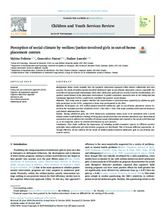Abstract
Background
Many critics consider that the cognitive behavioral approach (CBA) doesn’t sufficiently take into account the needs of welfare/justice-involved adolescent girls in out-of-home placement centers, especially the centrality of interpersonal relationships (with other adolescent girls and care worker) and the establishment of a positive social climate in the placement environment. A gender-responsive approach such as the Caring and Just Community Approach (CJCA), could better establish this positive social climate.
Objective
This study aims to explore whether the social climate is perceived more positively by adolescent girls who participate in the CJCA, compared to those who participated in the CBA.
Methods
Participants are 213 welfare/justice-involved adolescent girls in out-of-home placement centers located in the Canadian province of Québec (CJCA = 60; CBA = 153). This study combines self-reported measures and clinical administrative data.
Results
Among adolescent girls, the CJCA democratic community values seem to be associated with a social climate which could facilitate a feeling of being more involved in their out-of-home placement unit. Both clinical approaches seem to address the centrality of interpersonal relationships and respond to the needs to feel listened to, to be respected, and to be treated with fairness by care workers.
Conclusions
This study reaffirms the importance of including gender-responsive aspects to efficient practice principles when adolescent girl intervention programs are developed. This is because different approaches, although effective, do not address all the needs of welfare/justice-involved adolescent girls in out-of-home placement centers.
View article here.

